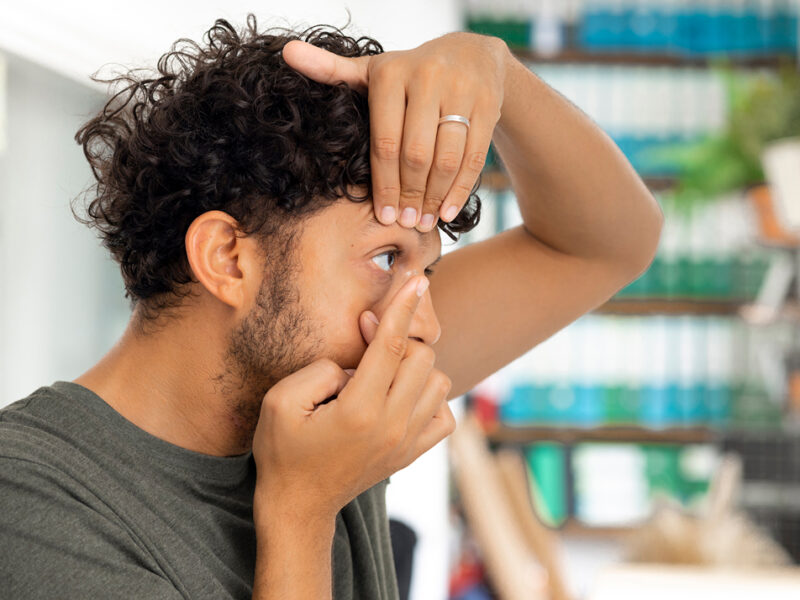Contact Lenses

Discovering Contact Lenses: Clear Vision, Comfort and Convenience
Contact lenses are thin, curved lenses that are placed on the surface of the eye to correct vision. They are typically made of soft, flexible materials that conform to the shape of the eye for comfort and ease of wear.
Read on to learn more about different types of lenses, who makes an ideal candidate for wearing them, and how you can obtain contact lenses to correct your vision. Whether you’re seeking freedom from glasses, want to alternate between glasses and contacts, or looking for a convenient alternative for sports and activities, contact lenses offer clear vision and comfort for all lifestyles.
Types of Contact Lenses
Contact lenses come in various types to suit different vision needs and preferences:
Soft Contact Lenses: Made from flexible, water-absorbing materials, soft contact lenses are known for their comfort and ease of wear. They’re available in options such as daily disposables, bi-weekly disposables, and monthly disposables, as well as specialized designs for astigmatism and presbyopia.
Rigid Gas Permeable (RGP) Lenses: RGP lenses are made from durable, oxygen-permeable materials that provide excellent vision correction and durability. They’re ideal for individuals with complex prescriptions or specific vision needs, such as astigmatism or irregular corneas.
Hybrid Contact Lenses: Hybrid lenses combine the comfort of soft lenses with the clarity of RGP lenses by featuring a soft lens center surrounded by a rigid outer ring. These lenses provide excellent vision correction for individuals with irregular corneas or high astigmatism.
Specialty Lenses: Specialty contact lenses are designed for specific vision needs, such as correcting high astigmatism, presbyopia, or irregular corneas due to conditions like keratoconus or post-surgical complications. These lenses are custom-made to fit your unique eye shape and prescription requirements.

Who Can Wear Contact Lenses
Contact lenses are prescribed and fitted by eyecare professionals after a comprehensive eye exam and contact lens fitting. They offer clear vision, convenience, and freedom from glasses for many individuals, but not everyone is a suitable candidate for wearing them.
Ideal candidates for contact lenses typically:
- Have a healthy cornea and tear film.
- Have stable vision and prescription.
- Are motivated to follow proper lens care and hygiene practices.
- Have realistic expectations about the benefits and limitations of contact lens wear.
- Are willing to attend regular follow-up appointments with their eyecare professional for monitoring and adjustments.
Can Children Wear Contact Lenses?
Yes, children can wear contact lenses, but it’s essential to consider several factors before determining if contact lenses are suitable for a child:
- Maturity and Responsibility: Contact lens wear requires a level of maturity and responsibility to handle and care for the lenses properly. Children should be able to follow instructions for lens insertion, removal, and cleaning consistently.
- Motivation and Comfort: Children who are motivated to wear contact lenses and express discomfort or dissatisfaction with glasses may be good candidates for contact lens wear. Comfort is crucial, as some children may find contact lenses more comfortable than glasses for certain activities.
- Eye Health: Children should have healthy eyes and no underlying eye conditions that could interfere with contact lens wear. An eyecare professional will assess the child’s eye health and determine if contact lenses are a safe option.
- Vision Correction Needs: Contact lenses are available to correct various vision conditions, including nearsightedness, farsightedness, and astigmatism. Children with significant refractive errors may benefit from contact lens wear for improved vision.
- Compliance with Care Instructions: Parents and children must understand and adhere to proper contact lens care and hygiene practices to minimize the risk of eye infections and complications. This includes regular cleaning, disinfection, and replacement of lenses as recommended by an eye care professional.
If a child meets the criteria for contact lens wear and is interested in trying them, it’s essential to work closely with an eyecare provider to ensure a proper fit and ongoing monitoring of eye health. The eyecare provider will conduct a comprehensive eye exam and contact lens fitting to determine the most suitable lenses for the child’s needs and provide guidance on lens care and safety. Regular follow-up appointments are essential to monitor the child’s comfort, vision, and eye health while wearing contact lenses.
If you’re unsure whether contact lenses are right for you, schedule a comprehensive eye exam with your eyecare provider to discuss your vision correction options and determine the best solution to meet your needs.
How to Get Contact Lenses
Obtaining contact lenses is a straightforward process that begins with a comprehensive eye exam and contact lens fitting with your eyecare provider.
Here’s how to secure your contact lenses:
- Schedule an Eye Exam: During your eye exam, your eyecare provider will assess your vision and eye health, discuss your lifestyle and vision needs, and determine if you’re a good candidate for contact lenses.
- Complete a Contact Lens Fitting: If contact lenses are deemed suitable for you, your eyecare provider will perform a contact lens fitting to select the appropriate lens type, size, and prescription for your eyes. They’ll also provide instructions on lens insertion, removal, and care.
- Embark on a Trial Period: You’ll be given a trial pair of contact lenses to wear for a specified period to evaluate comfort, vision quality, and compatibility with your eyes. Your eyecare provider will monitor your progress and make any necessary adjustments.
- Finalize your Prescription: Once you’ve found the right contact lenses, your eyecare provider will finalize your prescription – you can purchase a supply of lenses from your eyecare provider or use your prescription to purchase online or from other authorized retailers.
- Schedule Follow-Up Care: Regular follow-up appointments with your eyecare provider are essential for monitoring your eye health, assessing your contact lens fit, and ensuring optimal vision and comfort.
